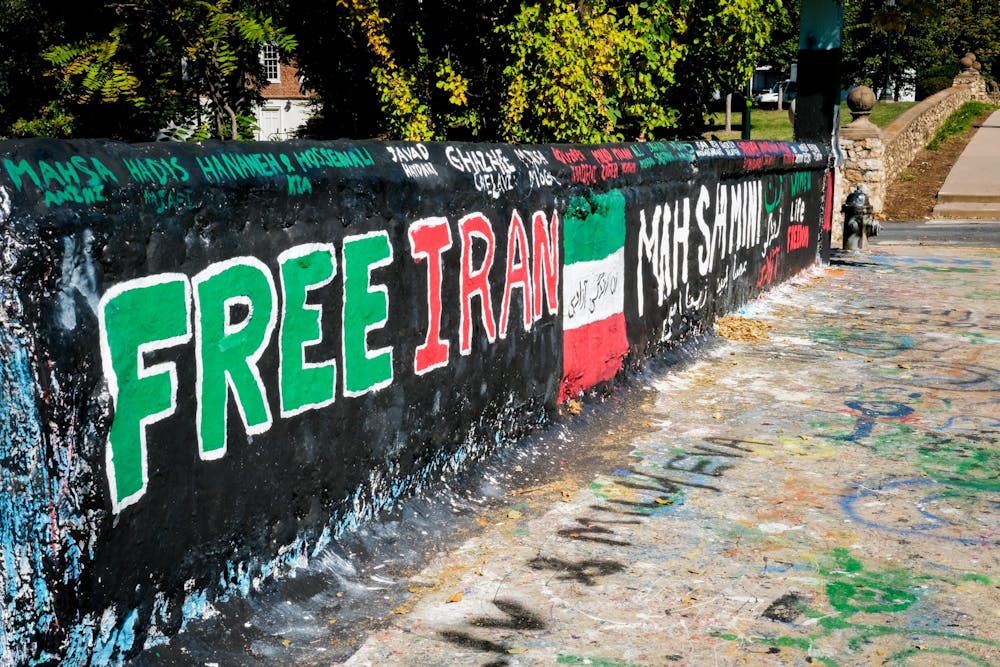Iranian students at the University are supporting protesters calling for revolution and human rights in Iran following the recent death of Mahsa Amini. For many of these students — who have family and friends in Iran — speaking out comes with great risk, but they believe raising awareness is a necessary step towards creating lasting change for Iranians.
Protests have erupted across Iran in response to the death of 22-year-old Mahsa Amini Sept. 16. Amini, a Kurdish woman visiting Tehran with her family, died after being detained by “morality police” — a branch of Iranian law enforcement specifically charged with enforcing dress code, also known as The Guidance Police — for allegedly wearing her hijab improperly.
The Iranian government has responded to these protests by arresting protestors, firing shots and tear gas into civilian homes and cutting off Internet access. As of Wednesday, the death toll is at 201.
At the University, the Persian Cultural Society spoke out in support of protesters and held a vigil for Amini. They also painted Beta Bridge with Amini’s name and the words “Free Iran” and “Women, Life, Freedom” to raise awareness of these recent events.
PCS also issued a statement requesting that University leadership address the events and support Iranian students iin accessing mental health services and light up the South Tower in red, green and white — the colors of the Iranian flag — in solidarity with the protesters.
The Asian Student Union and Women’s Center at the University have also issued statements standing in solidarity with Iranian students.
Abtin Afshar, president of the Iranian Student Association and doctorate student, said the response from the University, including a recent UVA Today article, has not been totally satisfying in part because it came so long after the protests began.
“When something like this happens and U.Va. does not show any strong reaction within the first 10 days, it feels like they don't believe we are as much of importance to them as other people here,” Afshar said.
In the article, University President Jim Ryan said that the events in Iran cause concern.
“As these events unfold, and as we learn of the stories of brave Iranian citizens expressing dissent, we are working to support members of U.Va.’s Iranian community,” Ryan told UVA Today.
Iranian forces have also targeted universities, including the elite Sharif University in Tehran. Students were chanting in protest against the regime when many students were detained by security forces.
Individuals and organizations worldwide have joined in speaking out in support of Iranian protesters. Some women have taken to social media, cutting off their hair and posting support for the demonstrators.
For Afshar, gaining global support is important because raising awareness and educating those outside of Iran can put pressure on the U.S. to end negotiations with the Iranian government.
“Every single negotiation, every single deal that the U.S. makes with Iran — for example, nuclear deals — all of them make Iran stronger,” Afshar said. “They enable Iran to oppress people more brutally.”
Despite feeling disappointed with the University's response and fear for their families, students feel hopeful for the future and are proud of Iranian protesters.
Many students, including Class of 2022 alumnus Mohamad Abdi, expressed feeling deeply worried about friends and family back in Iran and distracted from their work because of the recent events and their emotional impact.
“I can tell you over the past couple of weeks, half of the day, I was just browsing news websites to understand what's going on,” Abdi said. “So that takes up a lot of time, and you feel like you're left out. You could make a change, but you're here.”
One Iranian student spoke on the condition of anonymity, citing fears that the Iranian government would retaliate against their family and prevent the student from returning to Iran. The student expressed feeling heartbroken, but not surprised, at the news that Amini was killed at the hands of the morality police.
“I'm angry and I am proud of my people back home protesting,” the student said. “Iranian women are very brave, and they are at the forefront, and I'm angry just like them. I think the anger is what's keeping this revolution alive.”
The student recently visited Iran and said they witnessed women being stopped by the morality police, adding that they find the regime more strict than ever before.
“I never feared for my life in front of the morality police and just the police in general, like I did this time I went,” the student said.
Another Iranian student said they feel the mandatory hijab no longer symbolizes a connection to God, but rather, feels like a form of suppression.
“There are many incidents where you get insulted or not respected because you don’t comply with the mandatory hijab,” the student said.
Thousands of Iranians protested against the elevated prices of essential items in 2018 leading to the arrest of hundreds and the death of 25 individuals. Later, in 2019, 1,500 people were killed in a crackdown on anti-government protesters after the regime shut down the internet.
Abdi said the new wave of protests is distinct from previous instances in that protestors are entering their fourth week with no signs of stopping.
“What is unprecedented in this new wave of protests is that there are signs of [government forces] sort of giving up — a lot of footage is coming out [with] police running away from people,” Abdi said. “People aren’t giving up this time.”
Afshar said he feels pain at being so far away from his University during this time, unable to do anything in response to the violence against students.
“I crave to be in Iran just to be on the streets and just to protest against the government,” Afshar said. “It is so hard to see that these things are happening to our people, and we are not there to experience that.”







